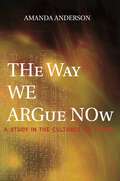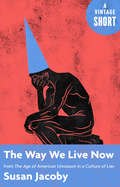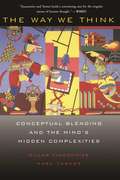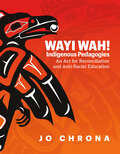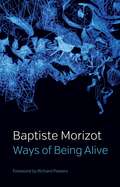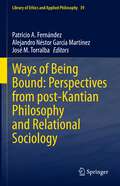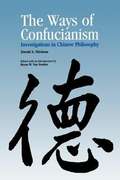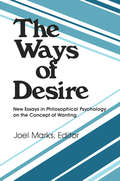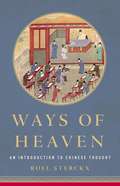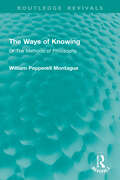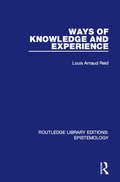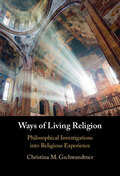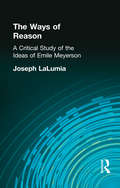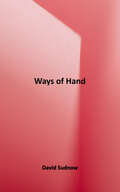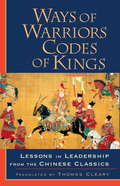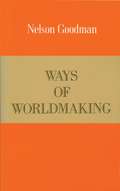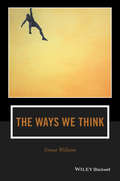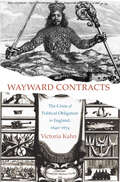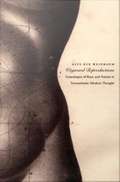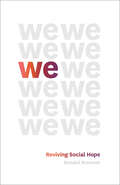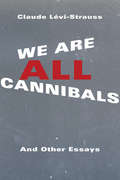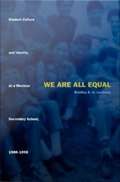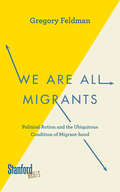- Table View
- List View
The Way We Argue Now: A Study in the Cultures of Theory
by Amanda AndersonHow do the ways we argue represent a practical philosophy or a way of life? Are concepts of character and ethos pertinent to our understanding of academic debate? In this book, Amanda Anderson analyzes arguments in literary, cultural, and political theory, with special attention to the ways in which theorists understand ideals of critical distance, forms of subjective experience, and the determinants of belief and practice. Drawing on the resources of the liberal and rationalist tradition, Anderson interrogates the limits of identity politics and poststructuralism while holding to the importance of theory as a form of life. Considering high-profile trends as well as less noted patterns of argument, The Way We Argue Now addresses work in feminism, new historicism, queer theory, postcolonialism, cosmopolitanism, pragmatism, and proceduralism. The essays brought together here--lucid, precise, rigorously argued--combine pointed critique with an appreciative assessment of the productive internal contests and creative developments across these influential bodies of thought. Ultimately, The Way We Argue Now promotes a revitalized culture of argument through a richer understanding of the ways critical reason is practiced at the individual, collective, and institutional levels. Bringing to the fore the complexities of academic debate while shifting the terms by which we assess the continued influence of theory, it will appeal to readers interested in political theory, literary studies, cultural studies, gender studies, and the place of academic culture in society and politics.
The Way We Live Now: from The Age of American Unreason in a Culture of Lies (A Vintage Short)
by Susan JacobyIn this selection from her searing cultural history of the last half century, Susan Jacoby chronicles the menacing surge of anti-rationalism in contemporary American life and the degradation of public speech in presidential rhetoric, radio broadcast, television, and internet media where homogenized language and thought reinforce each other in circular fashion. At today's critical political juncture, in which boastful ignorance has infected public discourse at the highest levels of government and throughout ordinary social media, this impassioned, tough-minded work challenges Americans to face the painful truth about what the flight from intellectualism, facts, and truth have cost us as individuals and as a nation.A Vintage Shorts Selection. An ebook short.
The Way We Think: Conceptual Blending and the Mind's Hidden Complexities
by Mark Turner Gilles FauconnierIn its first two decades, much of cognitive science focused on such mental functions as memory, learning, symbolic thought, and language acquisition --the functions in which the human mind most closely resembles a computer. But humans are more than computers, and the cutting-edge research in cognitive science is increasingly focused on the more mysterious, creative aspects of the mind. The Way We Think is a landmark synthesis that exemplifies this new direction. The theory of conceptual blending is already widely known in laboratories throughout the world; this book is its definitive statement. Gilles Fauconnier and Mark Turner argue that all learning and all thinking consist of blends of metaphors based on simple bodily experiences. These blends are then themselves blended together into an increasingly rich structure that makes up our mental functioning in modern society. A child's entire development consists of learning and navigating these blends. The Way We Think shows how this blending operates; how it is affected by (and gives rise to) language, identity, and concept of category; and the rules by which we use blends to understand ideas that are new to us. The result is a bold, exciting, and accessible new view of how the mind works.
Wayi Wah! Indigenous Pedagogies: An Act for Reconciliation and Anti-Racist Education
by Jo Chrona★ Starred selection for CCBC's Best Books Ideal for Teachers 2023!Now a National Best Seller! How can Indigenous knowledge systems inform our teaching practices and enhance education? How do we create an education system that embodies an anti-racist approach and equity for all learners? This powerful and engaging resource is for non-Indigenous educators who want to learn more, are new to these conversations, or want to deepen their learning. Some educators may come to this work with some trepidation. You may feel that you are not equipped to engage in Indigenous education, reconciliation, or anti-racism work. You may be anxious about perpetuating misconceptions or stereotypes, making mistakes, or giving offence. In these chapters, I invite you to take a walk and have a conversation with a good mind and a good heart. With over two decades in Indigenous education, author Jo Chrona encourages readers to acknowledge and challenge assumptions, reflect on their own experiences, and envision a more equitable education system for all. Each chapter includes reflection questions to help process the ideas in each chapter suggestions for taking action in both personal and professional spheres of influence recommended resources to read, watch, or listen to for further learning personal reflections and anecdotes from the author on her own learning journey voices of non-Indigenous educators who share their learning and model how to move into, and sit, in places of unknowing and discomfort, so we can examine our own biases and engage in this work in a good way Grounded in the First Peoples Principles of Learning, this comprehensive guide builds on Chrona&’s own experiences in British Columbia&’s education system to explore how to shape anti-racist and equitable education systems for all. Perfect for reading on your own or with your professional learning community!
Wayi Wah! Indigenous Pedagogies: An Act for Reconciliation and Anti-Racist Education
by Jo Chrona★ Starred selection for CCBC's Best Books Ideal for Teachers 2023!Now a National Best Seller! How can Indigenous knowledge systems inform our teaching practices and enhance education? How do we create an education system that embodies an anti-racist approach and equity for all learners? This powerful and engaging resource is for non-Indigenous educators who want to learn more, are new to these conversations, or want to deepen their learning. Some educators may come to this work with some trepidation. You may feel that you are not equipped to engage in Indigenous education, reconciliation, or anti-racism work. You may be anxious about perpetuating misconceptions or stereotypes, making mistakes, or giving offence. In these chapters, I invite you to take a walk and have a conversation with a good mind and a good heart. With over two decades in Indigenous education, author Jo Chrona encourages readers to acknowledge and challenge assumptions, reflect on their own experiences, and envision a more equitable education system for all. Each chapter includes reflection questions to help process the ideas in each chapter suggestions for taking action in both personal and professional spheres of influence recommended resources to read, watch, or listen to for further learning personal reflections and anecdotes from the author on her own learning journey voices of non-Indigenous educators who share their learning and model how to move into, and sit, in places of unknowing and discomfort, so we can examine our own biases and engage in this work in a good way Grounded in the First Peoples Principles of Learning, this comprehensive guide builds on Chrona&’s own experiences in British Columbia&’s education system to explore how to shape anti-racist and equitable education systems for all. Perfect for reading on your own or with your professional learning community!
Ways of Being Alive
by Baptiste MorizotThe ecological crisis is a very real crisis for the many species that face extinction, but it is also a crisis of sensibility – that is, a crisis in our relationships with other living beings. We have grown accustomed to treating other living beings as the material backdrop for the drama of human life: the animal world is regarded as part of ‘nature’, juxtaposed to the world of human beings who pursue their aims independently of other species.Baptiste Morizot argues that the time has come for us to jettison this nature─human dualism and rethink our relationships with other living beings. Animals are not part of a separate, natural world: they are cohabitants of the Earth, with whom we share a common ancestry, the enigma of being alive and the responsibility of living decent lives together. By accepting our identity as living beings and reconnecting with our own animal nature, we can begin to change our relationships with other animals, seeing them not as inferior lifeforms but as living creatures who have different ways of being alive.This powerful plea for a new understanding of our relationships with other animals will be of great interest to anyone concerned about the ecological crisis and the future of different species, including our own.
Ways of Being Bound: Perspectives from post-Kantian Philosophy and Relational Sociology (Library of Ethics and Applied Philosophy #39)
by Patricio A. Fernández Alejandro Néstor García Martínez José M. TorralbaThis book addresses the topic of 'being bound' from a philosophical and a sociological perspective. It examines several ways in which we are bound. We are bound to acknowledge the truth and to follow laws; we are bound to others and to the world. Who we are is partly defined by those bonds, regardless of whether we live up to them – or even of whether we acknowledge them. Puzzling questions arise from the fact that we are bound, such as: How are those bonds binding? Wherein lies their normative character? A venerable philosophical tradition, particularly since Kant, has provided an account of normativity that crucially appeals to such notions as “self-legislation.” But can our normative bonds be properly understood in these essentially first-personal terms? Many argue that our social condition resists any account of those bonds that fails to acknowledge the perspectives of the second and the third person. The first part of the book explores these themes from a historical perspective in the tradition of transcendental philosophy (Kant, Fichte, Hegel, Husserl and Heidegger); it examines the phenomenon of “being bound”, i.e., why and how we are bound. The second part of the book offers a sociological analysis of social bonds that is both historical and systematic. Based on sociological approaches to “solidarity” and “reflexivity”, it explores the way in which the phenomenon of “being bound” manifests through the concept of a “social relation”.
The Ways Of Confucianism: Investigations In Chinese Philosophy
by David S. Nivison Bryan Van Norden<P>The study of Chinese philosophy requires an unusual combination of talents.<P> First, one must be a philosopher at heart (if not of academic department), for the issues that Mencius, Zhuāngzĭ [Chinese text removed], Zhū Xī [Chinese text removed] Wang Yángmíng [Chinese text removed], and other Chinese thinkers address are living philosophic issues. <P>Just as it took someone with a genuine understanding of science--Joseph Needham--to first appreciate Chinese science, so it takes a genuine philosopher to fully engage Chinese philosophy.<P> Second, one must be a Sinologist, for even modern Chinese are separated by wide linguistic and cultural barriers from their predecessors.<P> And to study Chinese philosophy without the tools to overcome those barriers is merely to project one's own preoccupations and concerns onto an alien culture, thereby robbing oneself of the opportunity for a genuine "fusing of horizons." Among the generation of scholars who came to intellectual maturity following the second world war, several stand out for their knowledge of both philosophy and Sinology. Among these are A. C. Graham, D.C. Lau, Donald Munro, and David S. Nivison.<P> Of these four, Nivison's work is the least well known. Although highly respected in Sinological circles and among us "happy few" who study Chinese philosophy, Nivison has remained a philosopher's philosopher, and his work is not commonly cited.<P> Consider two outstanding recent histories of ancient Chinese philosophy--Benjamin Schwartz's The World of Thought in Ancient China (1985) and A. C. Graham's Disputers of the Too (1989). Schwartz cites only two papers by Nivison--one dating the conquest of the Shang by the Zhou (1983), and one a highly technical bit of philology analyzing Shang Dynasty oracle bone inscriptions (1978-1979). Graham, on the other hand, cites three articles by Nivison, only one of which is on philosophy (1980a), the other two essays dealing with chronological issues (1982-1983,1983).
The Ways of Desire
by Joel MarksFirst Published in 2017. Routledge is an imprint of Taylor & Francis, an Informa company.
Ways of Heaven: An Introduction to Chinese Thought
by Roel SterckxA brilliant history of ancient China's masters of philosophy -- and how they help us understand China today In Ways of Heaven, leading China scholar Roel Sterckx offers an engrossing introduction to classical China's world of ideas. Drawing on evocative examples from philosophical texts, literature, and everyday life over centuries of Chinese history, Sterckx introduces major thinkers and traditions, illuminates key concepts like the dao, qi, yin, and yang, and examines questions of leadership, social order, death, nature, and more. He also reveals how these ideas shape contemporary China, from table manners at a traditional banquet, to the Chinese obsession with education and family, to the rhetoric of political leaders and the nation's grand strategy. Essential reading for students, travelers, businesspeople, and anyone curious about this rising global power, Ways of Heaven shows that to comprehend China today we must learn to think Chinese.
The Ways of Knowing: Or The Methods of Philosophy (Routledge Revivals)
by William Pepperell MontagueThe Ways of Knowing (1925) examines the ways of attaining knowledge and verifying it, looking at the six methods of logic. It is also concerned with the epistemological problem of interpreting the relation of truth to the mind.
Ways of Knowledge and Experience (Routledge Library Editions: Epistemology)
by Louis Arnaud ReidOriginally published in 1961. This book is a study of some important ways of knowledge and experience and of the symbols through which they become articulate. Both ‘knowledge’ and ‘experience’ are interpreted in wide senses which are sanctioned by common use – though not always by the usage of philosophers and scientists. The four main fields considered are: the arts, religion, moral knowledge, and our knowledge of one another. These fields, though distinguishable, are nevertheless found to be interrelated in subtle and interesting ways, and it is contended that increase of ‘wisdom’, or ‘educated understanding’, can be achieved only through acceptance and assimilation of all their many-sided disciplines into personal insight. The book deals in a new way with questions of perennial interest which, because they are fundamental, are difficult. Nevertheless, the writing is lucid and untechnical and addressed to a wide range of readers.
Ways of Living Religion: Philosophical Investigations into Religious Experience
by Christina M. GschwandtnerWays of Living Religion provides a philosophical analysis of different types of religious experience - ascetic, liturgical, monastic, mystical, devotional, compassionate, fundamentalist - that focuses on the lived experience of religion rather than reducing it to mere statements of belief or doctrine. Using phenomenology, Christina M. Gschwandtner distinguishes between different kinds of religious experiences by examining their central characteristics and defining features, as well as showing their continuity with human experience more broadly. The book is the first philosophical examination of several of these types, thus breaking new ground in philosophical thinking about religion. It is neither a confessional treatment nor a reduction of the lived experience to psychological or sociological phenomena. While Gschwandtner's treatment focuses on Christian forms of expression of these different types, it opens the path to broader examinations of ways of living religion that might enable scholars to give a more nuanced account of their similarities and differences.
The Ways of Reason: A Critical Study of the Ideas of Emile Meyerson
by Joseph LaLumiaFirst published in 2002. Routledge is an imprint of Taylor & Francis, an informa company.
Ways of the Hand: The Organization of Improvised Conduct
by David SudnowThis is David Sudnow's classic account of how his hands learned to improvise jazz on the piano. David Sudnow is the author of Passing On and editor of Studies in Social Interaction. Since writing this book, he has developed a piano training method based on its insights.
Ways of Warriors, Codes of Kings: Lessons in Leadership from the Chinese Classics
by Thomas ClearyHere is a concise and user-friendly presentation of the ancient Chinese principles of leadership and strategy in the words of the masters themselves. Thomas Cleary has put together this collection of gems of wisdom from six of the great classics, including excerpts from his best-selling translation of The Art of War and other lesser-known but insightful texts.
The Ways We Think: From the Straits of Reason to the Possibilities of Thought (Journal of Philosophy of Education)
by Emma WilliamsThe Ways We Think critiques predominant approaches to the development of thinking in education and seeks to offer a new account of thought informed by phenomenology, post-structuralism and the ‘ordinary language’ philosophical traditions. Presents an original account of thinking for education and explores how this alternative conception of thought might be translated into the classroom Explores connections between phenomenology, post-structuralism and ordinary language philosophical traditions Examines the relevance of language in accounts of how we think Investigates the philosophical accounts of Gilbert Ryle, Martin Heidegger, John Austin and Jacques Derrida Draws upon experience of own teaching practice as philosopher-in-residence
Wayward Contracts: The Crisis of Political Obligation in England, 1640-1674
by Victoria KahnWhy did the language of contract become the dominant metaphor for the relationship between subject and sovereign in mid-seventeenth-century England? In Wayward Contracts, Victoria Kahn takes issue with the usual explanation for the emergence of contract theory in terms of the origins of liberalism, with its notions of autonomy, liberty, and equality before the law. Drawing on literature as well as political theory, state trials as well as religious debates, Kahn argues that the sudden prominence of contract theory was part of the linguistic turn of early modern culture, when government was imagined in terms of the poetic power to bring new artifacts into existence. But this new power also brought in its wake a tremendous anxiety about the contingency of obligation and the instability of the passions that induce individuals to consent to a sovereign power. In this wide-ranging analysis of the cultural significance of contract theory, the lover and the slave, the tyrant and the regicide, the fool and the liar emerge as some of the central, if wayward, protagonists of the new theory of political obligation. The result is must reading for students and scholars of early modern literature and early modern political theory, as well as historians of political thought and of liberalism.
Wayward Reproductions: Genealogies of Race and Nation in Transatlantic Modern Thought
by Alys Eve WeinbaumWayward Reproductions breaks apart and transfigures prevailing understandings of the interconnection among ideologies of racism, nationalism, and imperialism. Alys Eve Weinbaum demonstrates how these ideologies were founded in large part on what she calls "the race/reproduction bind"--the notion that race is something that is biologically reproduced. In revealing the centrality of ideas about women's reproductive capacity to modernity's intellectual foundations, Weinbaum highlights the role that these ideas have played in naturalizing oppression. She argues that attention to how the race/reproduction bind is perpetuated across national and disciplinary boundaries is a necessary part of efforts to combat racism. Gracefully traversing a wide range of discourses--including literature, evolutionary theory, early anthropology, Marxism, feminism, and psychoanalysis--Weinbaum traces a genealogy of the race/reproduction bind within key intellectual formations of the late nineteenth and twentieth centuries. She examines two major theorists of genealogical thinking--Friedrich Nietzsche and Michel Foucault--and unearths the unacknowledged ways their formulations link race and reproduction. She explores notions of kinship and the replication of racial difference that run through Charlotte Perkins Gilman's work; Marxist thinking based on Friedrich Engel's The Origin of the Family; Charles Darwin's theory of sexual selection; and Sigmund Freud's early studies on hysteria. She also describes W. E. B. Du Bois's efforts to transcend ideas about the reproduction of race that underwrite citizenship and belonging within the United States. In a coda, Weinbaum brings the foregoing analysis to bear on recent genomic and biotechnological innovations.
We: Reviving Social Hope
by Ronald AronsonThe election of Donald Trump has exposed American society’s profound crisis of hope. By 2016 a generation of shrinking employment, rising inequality, the attack on public education, and the shredding of the social safety net, had set the stage for stunning insurgencies at opposite ends of the political spectrum. Against this dire background, Ronald Aronson offers an answer. He argues for a unique conception of social hope, one with the power for understanding and acting upon the present situation. Hope, he argues, is far more than a mood or feeling—it is the very basis of social will and political action. It is this kind of hope that Aronson sees brewing in the supporters of Bernie Sanders, who advocated the tough-minded and inspired disposition to act collectively to make the world more equal, more democratic, more peaceful, and more just. And it was directly contrasted by Trump’s supporters who showed a cynical and nostalgic faith in an authoritarian strongman replete with bigotry and misogyny. Beneath today’s crisis Aronson examines our heartbreaking story: a century of catastrophic violence and the bewildering ambiguity of progress—all of which have contributed to the evaporation of social hope. As he shows, we are now in a time when hope is increasingly privatized, when—despite all the ways we are connected to each other—we are desperately alone, struggling to weather the maelstrom around us, demoralized by the cynicism that permeates our culture and politics, and burdened with finding personal solutions to social problems. Yet, Aronson argues, even at a time when false hopes are rife, social hope still persists. Carefully exploring what we mean when we say we “hope” and teasing hope apart from its dangerously misconstrued sibling, “progress,” he locates seeds of real change. He argues that always underlying our experience—even if we completely ignore it—is the fact of our social belonging, and that this can be reactivated into a powerful collective force, an active we. He looks to various political movements, from the massive collective force of environmentalists to the movements around Sanders and Jeremy Corbyn, as powerful examples of socially energized, politically determined, and actionably engaged forms of hope. Even in this age of Donald Trump, the result is an illuminating and inspiring call that anyone can clearly hear: we can still create a better future for everyone, but only if we resist false hopes and act together.
We All Have Different Abilities
by Melissa HigginsWhat can you do? Tie your shoes? Play piano? Everyone has different talents and abilities. Let's share and celebrate our many talents
We Are All Cannibals: And Other Essays
by Maurice Olender Jane Marie Todd Claude Levi-StraussOn Christmas Eve 1951, Santa Claus was hanged and then publicly burned outside of the Cathedral of Dijon in France. That same decade, ethnologists began to study the indigenous cultures of central New Guinea, and found men and women affectionately consuming the flesh of the ones they loved. "Everyone calls what is not their own custom barbarism," said Montaigne. In these essays, Claude Lévi-Strauss shows us behavior that is bizarre, shocking, and even revolting to outsiders but consistent with a people's culture and context.These essays relate meat eating to cannibalism, female circumcision to medically assisted reproduction, and mythic thought to scientific thought. They explore practices of incest and patriarchy, nature worship versus man-made material obsessions, the perceived threat of art in various cultures, and the innovations and limitations of secular thought. Lévi-Strauss measures the short distance between "complex" and "primitive" societies and finds a shared madness in the ways we enact myth, ritual, and custom. Yet he also locates a pure and persistent ethics that connects the center of Western civilization to far-flung societies and forces a reckoning with outmoded ideas of morality and reason.
We Are All Equal: Student Culture and Identity at a Mexican Secondary School, 1988-1998
by Bradley A. U. LevinsonWe Are All Equal is the first full-length ethnography of a Mexican secondary school available in English. Bradley A. U. Levinson observes student life at a provincial Mexican junior high, often drawing on poignant and illuminating interviews, to study how the the school's powerful emphasis on equality, solidarity, and group unity dissuades the formation of polarized peer groups and affects students' eventual life trajectories. Exploring how students develop a cultural "game of equality" that enables them to identify--across typical class and social boundaries--with their peers, the school, and the nation, Levinson considers such issues as the organizational and discursive resources that students draw on to maintain this culture. He also engages cultural studies, media studies, and globalization theory to examine the impact of television, music, and homelife on the students and thereby better comprehend--and problematize--the educational project of the state. Finding that an ethic of solidarity is sometimes used to condemn students defined as different or uncooperative and that little attention is paid to accommodating the varied backgrounds of the students--including their connection to indigenous, peasant, or working class identities--Levinson reveals that their "schooled identity" often collapses in the context of migration to the United States or economic crisis in Mexico. Finally, he extends his study to trace whether the cultural game is reinforced or eroded after graduation as well as its influence relative to the forces of family, traditional gender roles, church, and global youth culture. We Are All Equal will be of particular interest to educators, sociologists, Latin Americanists, and anthropologists.
We Are All Migrants: Political Action and the Ubiquitous Condition of Migrant-hood
by Gregory FeldmanNow more than ever, questions of citizenship, migration, and political action dominate public debate. In this powerful and polemical book, Gregory Feldman argues that We Are All Migrants. By challenging the division between those considered "citizens" and "migrants," Feldman shows that both subjects confront disempowerment, uncertainty, and atomization inseparable from the rise of mass society, the isolation of the laboring individual, and the global proliferation of rationalized practices of security and production. Yet, this very atomization--the ubiquitous condition of migrant-hood--pushes the individual to ask an existential and profoundly political question: "do I matter in this world?" Feldman argues that for particular individuals to answer this question affirmatively, they must be empowered to jointly constitute the places they inhabit with others. Feldman ultimately argues that to overcome the condition of migrant-hood, people must be empowered to constitute their own sovereign spaces from their particular standpoints. Rather than base these spaces on categorical types of people, these spaces emerge only as particular people present themselves to each other while questioning how they should inhabit it.
